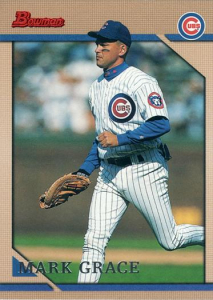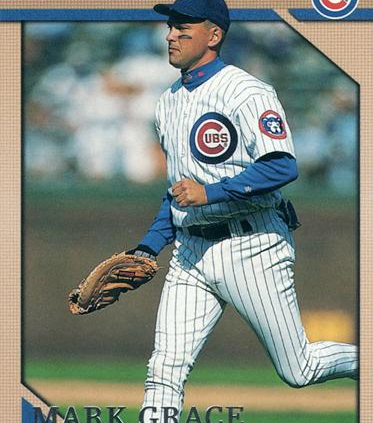April 1, 1996: Pat Hughes joins Cubs broadcast booth, Mark Grace wins opener in 10th
 Wrigley Field was decorated with pleated buntings for Opening Day 1996 between the Chicago Cubs and San Diego Padres, but the temperature of 38 degrees was more suited for football. The sellout crowd of 38,734 welcomed Ryne Sandberg’s return to the Cubs’ lineup after an absence of nearly two years.1 They were also getting underway in Cincinnati, the traditional game that starts the season.
Wrigley Field was decorated with pleated buntings for Opening Day 1996 between the Chicago Cubs and San Diego Padres, but the temperature of 38 degrees was more suited for football. The sellout crowd of 38,734 welcomed Ryne Sandberg’s return to the Cubs’ lineup after an absence of nearly two years.1 They were also getting underway in Cincinnati, the traditional game that starts the season.
In the radio booth, a new “Voice of the Cubs,” 40-year-old Vergil Patrick “Pat” Hughes, was getting comfortable in his new setting. Of the happenings on Opening Day 1996, the one with the most enduring impact on the Cubs franchise was the new voice on the radio. Hughes – who had begun his broadcast career with the Minnesota Twins, then spent 11 seasons with Bob Uecker in the Milwaukee Brewers’ booth – wore a colorful sweater, which he continued to wear on Opening Day each year as his career in Chicago stretched well into the twenty-first century.2
Most of the pregame anticipation was focused on the return of Sandberg, whose heavily decorated tenure as the Cubs’ second baseman – 1984 National League MVP, 10-time All-Star, 9-time Gold Glove, and 7-time Silver Slugger – had seemingly ended with his surprising retirement in May 1994, when he was hitting .238 through 57 games.
Now 36 years old, Sandberg had announced his return during the offseason; he was back at second base, batting second, for the opener. The ballpark was filled with “Welcome Back Ryno” signs.
The cool weather was accented by a stiff wind blowing in, not hospitable to hitters. Opening Day 1996 – scheduled for March 31 or April 1 around the majors – was the earliest in baseball history. Pitchers were given permission to blow into their hands on this day.
The Cubs’ 1995 season saw them improving under new manager Jim Riggleman, finishing two games over .500 after a 49-64 mark in 1994.3 Right fielder Sammy Sosa, second in the NL in ’95 with 36 homers, had emerged as one of the league’s top power hitters.
First baseman Mark Grace, who batted .326 in 1995 and received his third Gold Glove, was in the prime of his career and on his way to becoming the decade’s hits leader. Jamie Navarro, with a staff-best 14 wins in 1995, earned the Opening Day start. Riggleman knew the Padres well; he had been their skipper from 1992 to 1994.
Managing San Diego was 40-year-old Bruce Bochy, who had replaced Riggleman for the 1995 season. The Padres were led by Tony Gwynn, Wally Joyner, and Ken Caminiti. Gwynn had won six batting titles coming into 1996 and batted over .300 in 13 consecutive seasons. All-time stolen-base leader Rickey Henderson, who had spent the first 17 seasons of his career in the American League, had signed with San Diego as a free agent in December 1995, days after his 37th birthday.
The Los Angeles Dodgers were expected to win in the West Division, but the Padres were building momentum with a lineup full of contact hitters. Andy Ashby was San Diego’s starting pitcher for the opener.
Many fans were tuned in across the country on Chicago’s cable superstation WGN-TV, with 82-year-old Harry Caray continuing his half-century career in the booth. Listeners on the Cubs’ radio network heard Hughes – hired in November 1995 to replace the departing Thom Brennaman4 – alongside former Cubs third-base great Ron Santo.
Navarro struck out Henderson and Steve Finley to start the game before Gwynn’s first-pitch double gave the 35-year-old right fielder 100 career hits at Wrigley Field, but the Padres netted no runs. Sandberg received a standing ovation in his first at-bat; his drive to left was held inside the park by the wind and hauled in by Henderson.5
Joyner scored the game’s first run after two wild pitches by Navarro in the second. The Cubs threatened in the third when Jose Hernandez singled, stole second, and tagged up and took third on a ball to the warning track. He was left stranded after Navarro missed a sign for a suicide squeeze.
The game remained 1-0 until the Padres manufactured another run in the fifth with a successful squeeze bunt by Ashby. Cubs shortstop Rey Sanchez’s two-run homer tied it in the bottom of the frame.
As the bottom of the seventh was beginning, word reached Chicago that umpire John McSherry had collapsed and died while working behind home plate in Cincinnati after the seventh pitch of the game between the Cincinnati Reds and St. Louis Cardinals. McSherry was one of the most well-liked umps in the league. The game in Cincinnati was canceled.
At Wrigley Field, Sosa opened the seventh with a single. One out later, Scott Servais’ two-run homer made it 4-2, Cubs.
Another Navarro wild pitch scored Jody Reed in the eighth, and the Cubs caught a bad break in the bottom of the inning. Scott Bullett, batting for Navarro, led off with a walk against reliever Willie Blair. After Brian McRae sacrificed Bullett to second, Sandberg walked on four pitches, reaching base for the first time since June 7, 1994.
Grace, hitless in his first three at-bats, hit a sharp liner over third base, but Bullett lost his footing near home, fell, and was tagged out. Grace was denied an RBI; the Cubs lost a potential insurance run. It remained a one-run game going to the ninth.
Riggleman called on reliever Doug Jones, with the sixth club of what turned out to be a seven-team, 16-season career, to face Gwynn, Caminiti, and Joyner. After Gwynn grounded out, Caminiti singled up the middle, and Joyner doubled to left to tie the game.
Navarro had allowed only three hits in eight innings but would not get the win. However, it was his wild pitches that were responsible for two runs.
The Cubs went one-two-three in the bottom of the ninth to send the game to extra innings. In the 10th, with Jones still on the mound, the Padres threatened. Reed singled over Sandberg’s glove to start the inning. One out later, Henderson drew the 1,551st walk of his career, and lefty Bob Patterson replaced Jones.
The runners advanced to second and third on Finley’s groundout, and the Cubs intentionally walked Gwynn, loading the bases for Caminiti, who had hit a game-winning double in extra innings on Opening Day two seasons earlier for the Houston Astros. But Patterson struck out the switch-hitting third baseman for the third out.
Trevor Hoffman, 28 years old and San Diego’s closer since 1994, became the third Padres pitcher in the 10th. Sanchez singled and moved to second on McRae’s one-out single, setting up Sandberg with a storybook opportunity.
Sandberg walked on a full count to load the bases. Grace was next and took advantage of the infield in by slapping a hit down the third-base line, as Sanchez scored. The team celebrated their first win of the season on the infield.
The death of John McSherry dampened the mood afterward. Jim Riggleman said, “I heard early in the ballgame that he collapsed. I know at some point of our ballgame the umpires out here knew, and it was tough conditions for them to work under.”6 Grace added, “It just breaks my heart. He was really one of the nicest men I have ever run into.”7
“He was the umpire, one of the best and most consistent,” Gwynn said.8
The Padres ended up winning the NL West Division championship in 1996; Caminiti hit 40 homers and got the National League MVP Award. The Cubs finished fourth in the NL Central Division. Sandberg retired after the 1997 season, and Chicago made the playoffs as the wild card under Riggleman in 1998.
Hughes had a lot to talk about during his first game: Sandberg’s return, the death of McSherry, and an extra inning walk-off victory. Hughes was ready for a long career in the Cubs booth, covering thousands of games. In 2016 he was on the microphone for the Cubs’ first World Series victory since the beginning of commercial radio broadcasts of baseball in the 1920s. He was still in the Cubs’ radio booth at the start of the 2023 season.
In 2022 the National Baseball Hall of Fame honored Hughes with the Ford C. Frick Award for broadcasting contributions. Hughes joined three other Cubs broadcasters who had received the award: Jack Brickhouse, Milo Hamilton, and Caray, who was on the air through the 1997 season before dying on February 18, 1998.
Hughes has established a reputation for his uncanny ability to recall details of past games as well as facts from baseball history. His voice became the soundtrack to summer for a generation across the Midwest.
Acknowledgments
This article was fact-checked by Ray Danner and copy-edited by Len Levin.
Sources
In addition to the sources cited in the Notes, the author consulted Baseball-Reference.com and Retrosheet.org for pertinent information, including the box score and play-by-play. He also reviewed a recording of WGN-TV’s game broadcast, posted on YouTube.
https://www.baseball-reference.com/boxes/CHN/CHN199604010.shtml
https://www.retrosheet.org/boxesetc/1996/B04010CHN1996.htm
Notes
1 Gene Wojciechowski, “Grace Closes Opener,” Chicago Tribune, April 2, 1996: 195.
2 “The legend Pat Hughes is wearing his ceremonial opening-day sweater. He wore it on his first game as a Cubs radio man in 1996. ‘It looks very ’90s, doesn’t it?’” reported sportswriter Jon Greenberg on Twitter on Opening Day 2022. Jon Greenberg, @jon_greenberg, Twitter, April 7, 2022, https://twitter.com/jon_greenberg/status/1512155506680475652?lang=en.
3 The normal 162-game schedule was curtailed after the players union struck in August.
4 Steve Nidetz, “Brewers No. 2 Voice Joins Cubs,” Chicago Tribune, November 30, 1995: 57; JR Radcliffe, “Former Milwaukee Brewers, Marquette Announcer Pat Hughes Awarded Ford C. Frick Award from Baseball Hall of Fame,” Milwaukee Journal Sentinel, December 7, 2022, https://www.jsonline.com/story/sports/2022/12/07/ex-brewers-announcer-pat-hughes-given-honor-from-baseball-hall-of-fame/69709419007/.
5 Bill Jauss, “’Nervous’ Sandberg Just Glad to Be Back,” Chicago Tribune, April 2, 1996: 9.
6 Fred Mitchell, “Riggleman Won’t Throw Changeup at His Closer,” Chicago Tribune, April 2, 1996: 10.
7 Mitchell, “Riggleman Won’t Throw Changeup at His Closer.”
8 John Schlegal, “Padres Saddened by Umpire’s Death,” North Country Times (Escondido, California), April 2, 1996: 2.
Additional Stats
Chicago Cubs 5
San Diego Padres 4
10 innings
Wrigley Field
Chicago, IL
Box Score + PBP:
Corrections? Additions?
If you can help us improve this game story, contact us.


